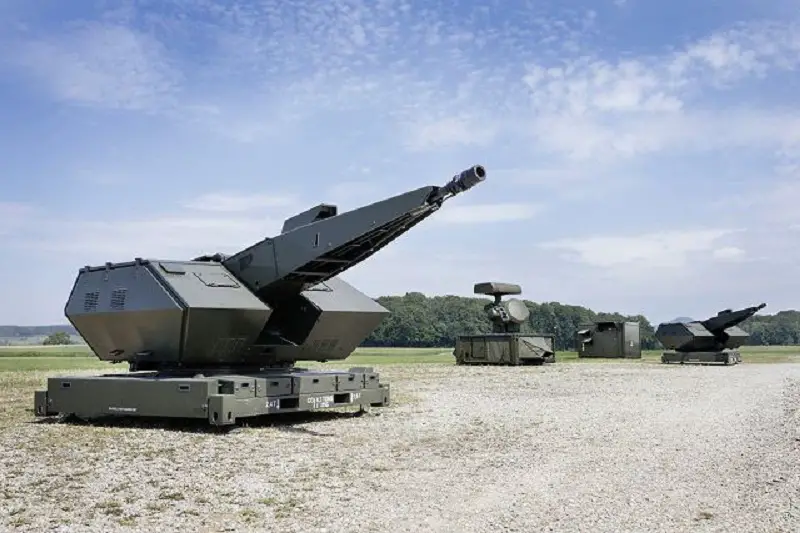The Oerlikon Skyshield Air Defence System is a ground-based Short Range Air Defense (SHORAD) system developed by the Swiss Company Oerlikon Contraves (now a subsidiary of Rheinmetall of Germany). The successor to the Skyguard defense system, Skyshield is intended to rapidly acquire and destroy threatening aircraft and missiles, as well as to fulfill a C-RAM (Counter Rocket, Artillery, and Mortar) role. A modified and improved version of Skyshield with six fully automated turrets, dubbed MANTIS (Modular, Automatic and Network capable Targeting and Interception System) has been ordered by the German Army as a stationary base defence system. The Oerlikon Skyranger is a mobile ground based air defence (GBAD) system which can be deployed against air targets at short and very short range and against ground targets.

The weapons system itself consists of two 35 mm (1.38 inch) revolver cannons with a rate of fire of 1,000 rounds per minute, a fire control system made up of a sensor unit and a detached command post. The Skyshield can also use up to two surface-to-air missile 8-cell modules for an expanded air defense capability. The Skyshield is designed for traditional anti-aircraft roles in addition to defense against missiles . Up to 20 stored engagement bursts may be fired to counterattacks, including those with high saturation rates, the ultra-short reaction time of the Skyshield 35/1000 Ahead air defence system offering detection to firing in less than 4.5 seconds. Despite its higher costs, the AHEAD round is much more cost-effective than High-explosive incendiary (HEI). The AHEAD round ejects a lethal shower of 152 spin-stabilized sub-projectiles, with a mass of 3.3g each, in a cone with a 10° opening angle released by each round just “ahead” of the approaching target, at a position determined by a programmable, electronic, time fuze in the base of the projectile.

The Skyshield fires the 35mm Air Burst Ammunition Ahead able to destroy the target by multiple impacts of heavy metal, spin-stabilized sub-projectiles. Each 35 mm Ahead shell contains a payload of 152 sub-projectiles, which are ejected just ahead of the incoming target, triggered by a precision programmable time fuse. A short burst of 35 mm Ahead ammunition produces a cloud of lethal sub-projectiles, resulting in sustained saturation of the anticipated target position. The sub-projectiles are fully capable of penetrating the skin of current and anticipated future targets, while still inflicting enough damage on the attacking target, e.g. unmanned air vehicles, to keep them from achieving their mission. The 35/1000 Revolver Gun can also fire the 35 mm AHEAD (Advanced Hit Efficiency And Destruction) ammunition. AHEAD is designed specifically for small, very low and fast-flying targets such as drones, dispensers and missiles, and it can be used by all 35 mm guns retrofitted with the muzzle-velocity gauge and an electronic processing unit.

The Skyshield is easily deployed by trucks and other transportation systems. The fire control system (FCS) uses an X-band search and tracking radar, and another unit for radar/TV and/or laser/FLIR precision tracking. The command post can be placed up to 500 meters, roughly, from the fire control unit (FCU), using encrypted radio-waves. The Skyshield system can also be networked with other air defense systems for wider and more effective air coverage, expanding its roles from point defense to area defense. An Oerlikon Skyshield system typically consists of a sensor/C4l module with radar and electro-optical sensors as well as effectors deployed within the base perimeter. One of the main advantage of the Oerlikon Skyshield system is the protection it offers to the crew: the sensor module, guns and launchers are all unmanned Moreover, the command post can be deployed up to 500 metres away from the sensor module The entire system can operate in all weathers, is highly resistant to electronic countermeasures, and can be networked with other C4I systems. The Skyshield system can also be networked with other air defense systems for wider and more effective air coverage, expanding its roles from point defense to area defense.














